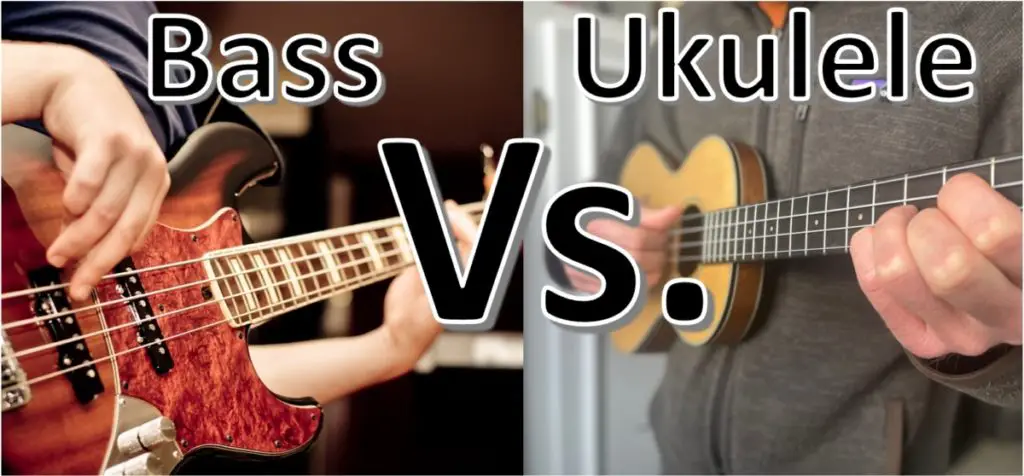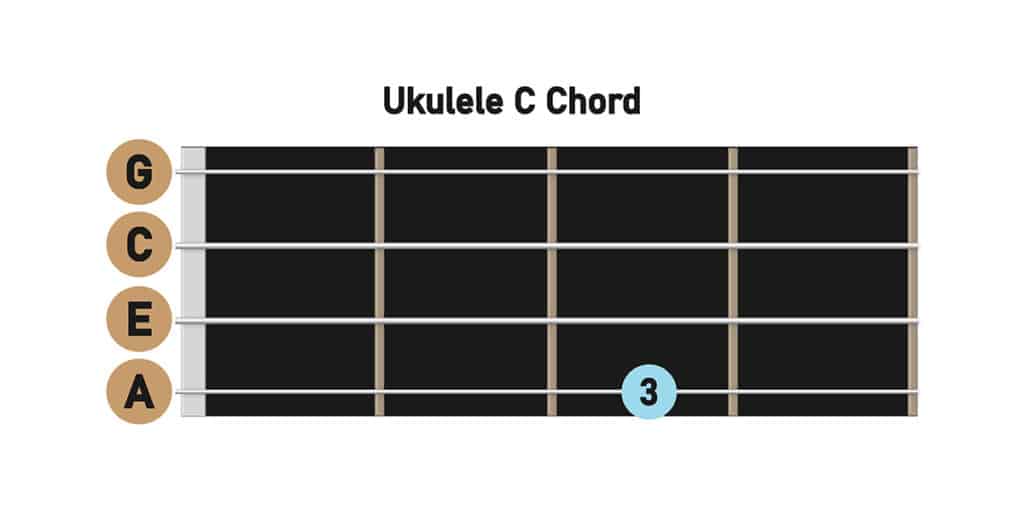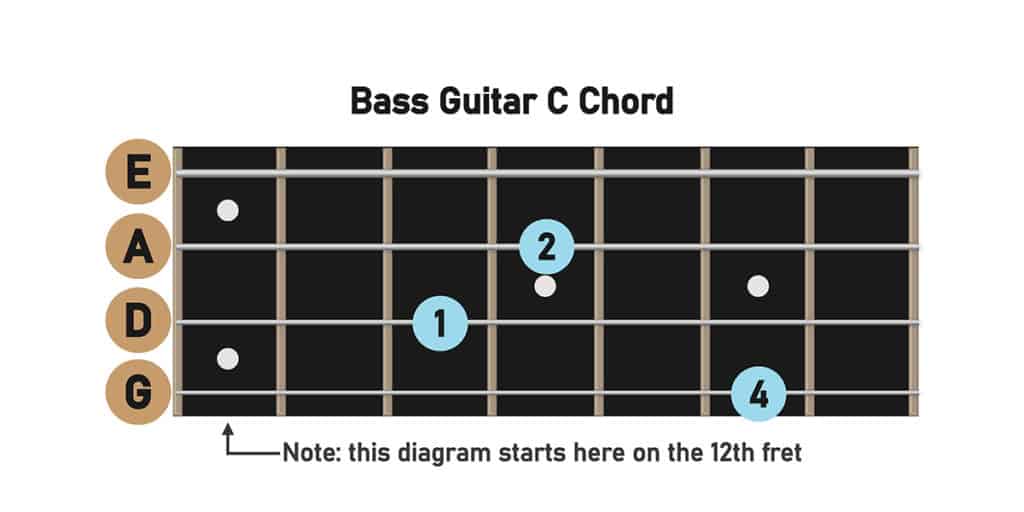Today I will be discussing the differences between the ukulele and bass guitar.
As someone who has taught ukulele lessons and is familiar with forming chords on the bass, I can tell you about the common ground between the two instruments.
Although both instruments have four strings, they do not have as much in common as you might imagine. So let’s take a deeper look at playing chords on these instruments as well as the skills that may be transferrable between the two.
Are Ukulele and Bass Chords the Same?

Ukulele and bass chords are not the same, because their strings are tuned to different notes and there are also different intervals between the notes. For example, if you tried to play a C Major chord on a bass guitar, and then used the same finger position on a ukulele, it would not produce a C Major chord.
To drive this point home, take a look at the following diagrams depicting a C Major chord on the ukulele fretboard and an C Major chord on the fretboard of a bass guitar.
C Major chord on a ukulele:

C Major chord on a bass guitar:

In order to fully comprehend the difference between ukulele chords and bass chords, you also have to look at the way that each instrument is tuned.
The strings of a ukulele are tuned G-C-E-A, or perfect fifth (down), major third (up), perfect fourth (up).
The strings of a bass are tuned E-A-D-G, or perfect fourth (up), perfect fourth (up), perfect fourth (up).
The differences between these two tuning systems are the reason that chord shapes are not transferable between ukulele and bass guitar.
In other words, since the intervals between the strings of the ukulele are not the same as the intervals between the strings of the bass guitar, identical chord shapes do not produce identical chord structures.
Differences Between Ukulele and Bass
Here are some of the most important distinctions between ukulele and bass. You’ll want to keep this things in mind if you are choosing between the two.
1. Size
The bass guitar is significantly larger, longer, and heavier than a ukulele. These factors influence the way it feels to play and transport each instrument.
The size and weight of a bass guitar may be impractical for some people, especially when playing in a standing position. The ukulele is probably comfortable for a wider range of people, although it is possible that the ukulele may be uncomfortably small.
2. Function
Although it is possible to play chords on bass guitar, this is typically not its primary function. The bassist commonly plays single notes that support the rhythm and harmony of a song.
Bass chords can be an excellent addition to a song, if used tastefully. However, chords on the bass have the potential to be too loud or even detract from the clarity of the music.
Chords are typically the primary function of the ukulele. The light tone and higher pitch of its strings allow ukulele chords to blend more easily with a voice or other accompanying instruments.
3. Price
The difference in price is significant. A beginner level ukulele should cost around $20-30. A beginner level bass guitar will typically cost around $100-150. Although you may be able to find a more affordable one in the used market. Other gear such as an amplifier, and cable, add to the expense of a bass set-up.
4. Amplification
Bass guitar is practically always played through an amplifier, it is pretty quiet on its own. On the other hand, the sound of the ukulele projects better on its own and amplification is only necessary in certain situations.
Skills That Transfer from Ukulele to Bass (and Vice Versa)
1) Fretting
The concept of fretting a note, depressing the string so that it contacts a fret, is the same with both instruments. This applies to single notes as well as chords.
2) Picking and Fingerstyle
The strings of both instruments can be picked with a plectrum, or played finger style. Either way, single notes and chords are possible.
3) Single String Melodies
If you learn a melody on one string, you can play it the same way on both instruments. Although, playing on a different string will put the melody in a different key.
If you learn a melody using multiple ukulele strings you’ll likely have to make some adjustments when trying the melody on bass. If you memorize the melody in your mind, with some work you may be able to find it on the bass guitar.
4) Playing Positions
Both instruments use the same two playing positions: seated with the instrument on your lap, or standing and using a strap. Posture is very important for all musicians and learning proper posture for ukulele will inform your posture for playing bass, and vice versa.
5) Maintenance
Maintenance of both instruments is pretty similar. Both require you to change the strings, clean the instrument, and store it properly.
6) Tuning
Although the ukulele uses a different tuning system than the bass guitar, the basic idea and technique of tuning each instruments is the same. In both cases, the strings are wound around a peg which rotates, increasing the tension of the string.
7) Rhythm
Any rhythmic idea that you learn on one instrument should be applicable to the other. Once you are comfortable playing different rhythmic values such as quarter notes, eighth notes, and triplets, it is easy to apply these ideas to either instrument, although it will take practice.
Is Ukulele or Bass Easier to Play?
It’s easier to play the ukulele than the bass. From a technical standpoint, ukulele is smaller and has strings that are thinner, lighter, and easier to play. Bass guitars tend to be much larger, has heavier strings, and requires more gear for amplification if you’re using an electric bass (which is the most common).
With that said, I would say that the bass guitar is more straightforward in terms of concept. The consistency of the tuning (all perfect fourths) makes the layout of notes, scales, and chords simple and easy to memorize.
And at the end of the day, this is a subjective question.
The more important questions are:
- Are you physically comfortable playing both instruments, or only one?
- Would you like to play in the low range, with powerful notes, or do you want to play in a higher range, with lighter sounding chords?
Fortunately, most people will be able to do both if they so choose. They are both great instruments with great, yet different qualities!